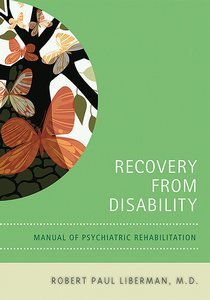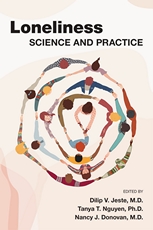Recovery From Disability
Manual of Psychiatric Rehabilitation
View Pricing
Description
The time is right for recovery from serious mental disorders. Mental health professionals and state and local mental health agencies are responding to a national call for action on recovery: from the President's Commission on Mental Health, the Surgeon General, the National Alliance on Mental Illness, and the Substance Abuse and Mental Health Services Administration. But how can recovery from mental disorders become a reality? Recovery From Disability describes the principles and practices of psychiatric rehabilitation to bridge the gap between what is known and what actually can be used to achieve recovery for patients in real-life mental health programs. The book draws on Dr. Robert Paul Liberman's 40 years of designing, testing, and disseminating innovative treatments for persons with mental disabilities. Illuminating up-to-date treatment techniques that reflect a consensus of experts regarding evidence-based practices, Dr. Liberman shows how recovery can be the rule rather than the exception.
This practical book addresses day-to-day realities faced by practitioners who must wrestle with the individualized needs and personal goals of each patient while drawing up a rehabilitation roadmap to recovery. Written in a down-to-earth manner with minimal jargon, this clinical manual is intended for everyday use. Brimming with clear advice and ideas for effective services, the book is relevant to the work of all mental health disciplines, administrators, consumer advocates, and clinicians with all levels of experience. Practice-based evidence is highlighted by an abundance of real-life examples and a host of graphic aids. The author addresses the particular needs of Latino patients and takes up the latest developments in rehabilitation, such as illness management, social and independent living skills training, neurocognitive pharmacology, cognitive remediation, and use of computers in rehabilitation. Each chapter contains information, techniques, and treatment methods that enable clinicians to:
- Help patients select realistic yet personally meaningful goals for enriching their lives
- Teach patients how to stabilize their symptoms and cognitive impairments
- Train patients in social and independent living skills for empowerment and autonomy
- Educate family members and other caregivers to collaborate with mental health professionals in overcoming their loved one's disability
- Provide access to vocational rehabilitation, including supported employment
- Facilitate comprehensiveness, continuity, and coordination of competency-based rehabilitation, using personal support specialists, assertive community treatment, and integrated mental health care
Dr. Liberman also describes how to customize services that are effective for individuals with more than one disorder, whose disorder is refractory to customary pharmacological and psychosocial treatments, or whose adaptation to community life is marred by aggressive behavior. With its wealth of rich and immediately applicable treatment approaches, Recovery From Disability will help professionals equip mentally disabled patients to reach their personally relevant goals and progress on the road to recovery.
Contents
- Foreword
- Preface
- Acknowledgments
- Introduction
- Terminology
- Chapter 1.
About the Authors
Robert Paul Liberman, M.D., is Distinguished Professor in the Department of Psychiatry and Biobehavioral Sciences, and Director of the UCLA Psychiatric Rehabilitation Program, at the University of California, Los Angeles.
Related Products
Carousel Control - items will scroll by tabbing through them, otherwise arrows can be used to scroll one item at a time








